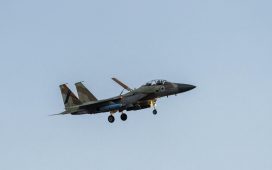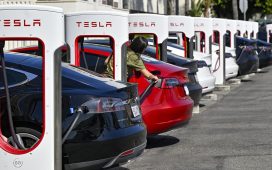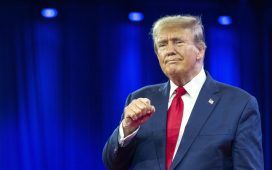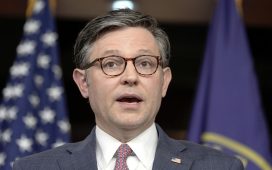With help from Brianna Gurciullo
Editor’s Note: Morning Transportation is a free version of POLITICO Pro Transportation’s morning newsletter, which is delivered to our subscribers each morning at 6 a.m. The POLITICO Pro platform combines the news you need with tools you can use to take action on the day’s biggest stories. Act on the news with POLITICO Pro.
Advertisement
— Airports depart from airlines in one key plank of their plan to get back to some modicum of normal travel — whether or not to screen passengers for symptoms.
— New York Gov. Andrew Cuomo is in Washington today to pitch infrastructure as an economic stimulus to President Donald Trump.
— SpaceX today will be the first private company to launch a rocket into space with humans aboard.
IT’S WEDNESDAY (but it feels like a Tuesday!): Thanks for tuning in to POLITICO’s Morning Transportation, your daily tipsheet on all things trains, planes, automobiles and ports. Sam is back in action: [email protected] or @samjmintz.
LISTEN HERE: Follow MT’s playlist on Spotify. What better way to start your day than with songs (picked by us and readers) about roads, railways, rivers and runways.
HERE’S WHERE AIRPORTS AND AIRLINES DISAGREE: The Airports Council International is warning that screening passengers for coronavirus symptoms at airports could create crowding and long lines, which “would be counterproductive in terms of physical distancing, and also create unnecessary concerns about the safety of the aviation system.” In its best-practices guidance, released today, ACI promotes “self-declaration of health,” preferably done electronically, as our Brianna Gurciullo reports.
On the other hand: Airlines for America has called for TSA to begin screening passengers as part of its security duties. Some lawmakers have questioned whether TSA even has the authority to do so, and ACI doesn’t want it done by security workers or airport staff. Given that virus carriers can present no symptoms, ACI warned of “false positives and false negatives.”
SHE’S SO HEAVY: Governments across the globe have so far given airlines $123 billion in coronavirus assistance, “essentially keeping the industry on life support,” the International Air Transport Association’s chief economist said Tuesday. However, more than half of that assistance adds to airlines’ debt, Brian Pearce told reporters on a press call. IATA estimated that the industry’s debt could hit $550 billion by the end of this year. “Debt is going to be a very substantial burden on the industry as it moves into the recovery/restart phase,” Pearce said, adding that “we could easily see airline failures under the weight of this debt.”
NOT WHAT WE MEANT: Seventy-four House members wrote to Treasury Secretary Steven Mnuchin on Tuesday to ensure that airlines that received government assistance are carrying Congress’ intent to protect airline workers. “Reducing hours while ‘maintaining rate of pay‘” — as United, Delta Air Lines, and JetBlue have done — “goes directly against this goal and places these airlines out of compliance with the CARES Act,” they wrote.
MAY WE: Airlines for America has asked the FAA to exempt its members from several federal regulations so they can put cargo in their planes’ main decks on flights not carrying passengers. The public will have five days to comment, according to a draft Federal Register notice.
DRONE DELIVERIES FOR COVID: The drone delivery company Zipline plans to announce today that it will deliver PPE and other medical supplies by drone to frontline medical responders. The new service relies on an FAA waiver for Zipline’s partner, the hospital system Novant Health in North Carolina, and Zipline says it’s the first “ongoing long range drone logistics flights” to be approved by the agency, as well as the first approval of such ongoing flights to use class D airspace.
The nuts and bolts: The highest-profile companies that the FAA approved for drone delivery (Wing and UPS) received Part 135 air carrier certificates, which are subject to a complex application process. But Novant has a Part 107 license, which is the standard certification for thousands of commercial drone operators — but with an FAA waiver allowing Novant to fly its drones beyond the line of sight of the operator.
The big but: It’s still required to use visual observers on the ground along the drones’ route. As an FAA official explained it in an email obtained by POLITICO: “Novant must have enough visual observers to identify any other aircraft in the airspace in which operations occur.”
Pros can read the full waiver approval, with all of the details.
Calling all China watchers: The trajectory of the U.S.-China relationship will determine whether this century is judged a bright or a dismal one. POLITICO’s David Wertime is launching a new China newsletter that will be worth the read.
WHITE HOUSE GETS A VISITOR FROM NEW YORK: Cuomo wants to work with the White House on infrastructure investment as a way to “supercharge” the economy as the country — and New York in particular — reels from Covid-19. He said infrastructure is on the agenda for his meeting with Trump today.
The to-do list: “Everyone has been talking about the need to do major infrastructure in this nation,” Cuomo said at a news conference on Tuesday. ”There is no better time to build than right now.” The governor promised to accelerate the construction on the new Penn Station and at LaGuardia airport and urged the federal government to deliver approvals for the Second Avenue Subway line, for a transit connection to LaGuardia and for the cross-Hudson tunnels.
PERHAPS THEY’RE LISTENING: FRA on Tuesday granted New Jersey $91.5 million to help replace the 110-year-old Portal North Bridge across the Hackensack River and make other upgrades along Amtrak’s busy Northeast Corridor, reports POLITICO’s Samantha Maldonado. The $55.1 million in the grant for actually replacing the bridge is a small down payment on the expected $1.7 billion price tag for the project.
The rest of the money will help NJ Transit reconstruct and elevate the electrical facility that powers main line services along the Northeast Corridor, which is also part of the Gateway Program to restore the century-old rail connection between New Jersey and midtown Manhattan. The federal government and the states still have not come to an agreement on funding the replacement of the Hudson tunnels.
AMTRAK NEEDS MORE: Amtrak is asking Congress for $1.5 billion more than its February budget request of $2 billion, saying it needs the extra money to offset an expected 50 percent drop in ridership in fiscal 2021 and maintain minimum service levels. Currently, ridership is around 5 percent of normal, as your pinch-hitting MT host reports. Amtrak got $1 billion from the CARES Act in late March.
Saving money, cutting personnel: Amtrak said in its letter to Congress that it was considering layoffs, among other options, to cut personnel costs, and later in the day, the Wall Street Journal reported that Amtrak is preparing to cut up to 20 percent of its workforce. Former Amtrak CEO Richard Anderson, who is still a senior adviser to his successor, Bill Flynn, told our Sam Mintz earlier this month that Amtrak would not have to resort to layoffs. Amtrak declined to comment.
MEGABUS HEARTS NEW YORK: Megabus will start serving New York City again on June 1. The company will run two buses a day in each direction between Washington, D.C., and New York — down from 20 a day before coronavirus. In addition to sanitation efforts, Megabus requires passengers to wear masks and is selling a reduced number of seats to allow for distancing.
REMEMBER TO LOOK UP: Today at 4:33 p.m., the country can watch the SpaceX launch off Cape Canaveral, the first commercial spaceflight carrying humans. According to POLITICO’s Jacqueline Feldscher, the launch — the first from U.S. soil with astronauts aboard since 2011 — signifies “the United States’ ambitions to reclaim its independence as a space-faring nation” and “a first step to working with commercial providers on ventures like private space stations or human travels to the lunar surface.”
BACK IN COMSTAC-TION: The FAA has rescheduled a (virtual) meeting of the Commercial Space Transportation Advisory Committee to June 22, according to a notice in the Federal Register. The FAA said “a variety of issues” caused it to postpone the meeting, which was previously scheduled for May 19.
TRUST BUT VERIFY: CBP has extended the temporary closure of its Trusted Traveler Program enrollment centers until at least July 6, affecting Global Entry, NEXUS, SENTRI and FAST enrollment. Global Entry mobile enrollment events are also on pause, but travelers with conditional approval will be able to enroll at participating airports after arriving on an international flight. Applicants now have 485 days from the date of conditional approval to complete the enrollment process.
— “Latam Airlines seeks bankruptcy protection as travel slumps.” The Associated Press.
— “USTR may again change the list of EU goods subject to Airbus retaliation.” POLITICO Pro.
— “Macron takes the driving seat in auto recovery plan.” POLITICO Europe.
— “Boeing and Airbus study how coronavirus behaves during air travel.” The Wall Street Journal.
— “Amazon in advanced talks to buy self-driving-car tech company Zoox.” The Wall Street Journal.
DOT appropriations run out in 126 days. The FAA reauthorization expires in 1,222 days. Highway and transit policy is up for renewal in 126 days.









